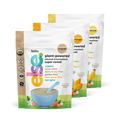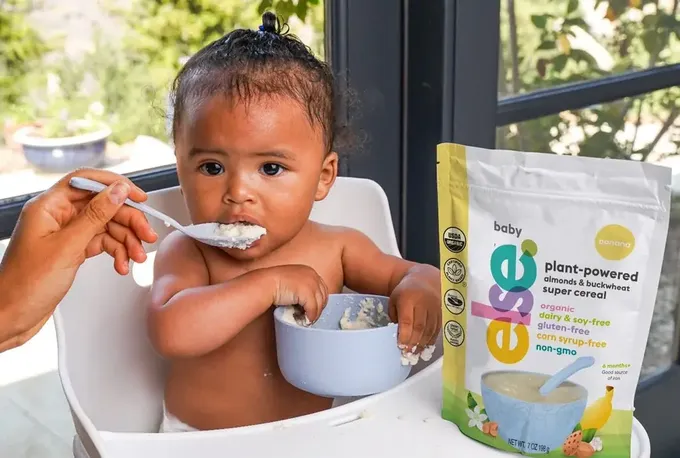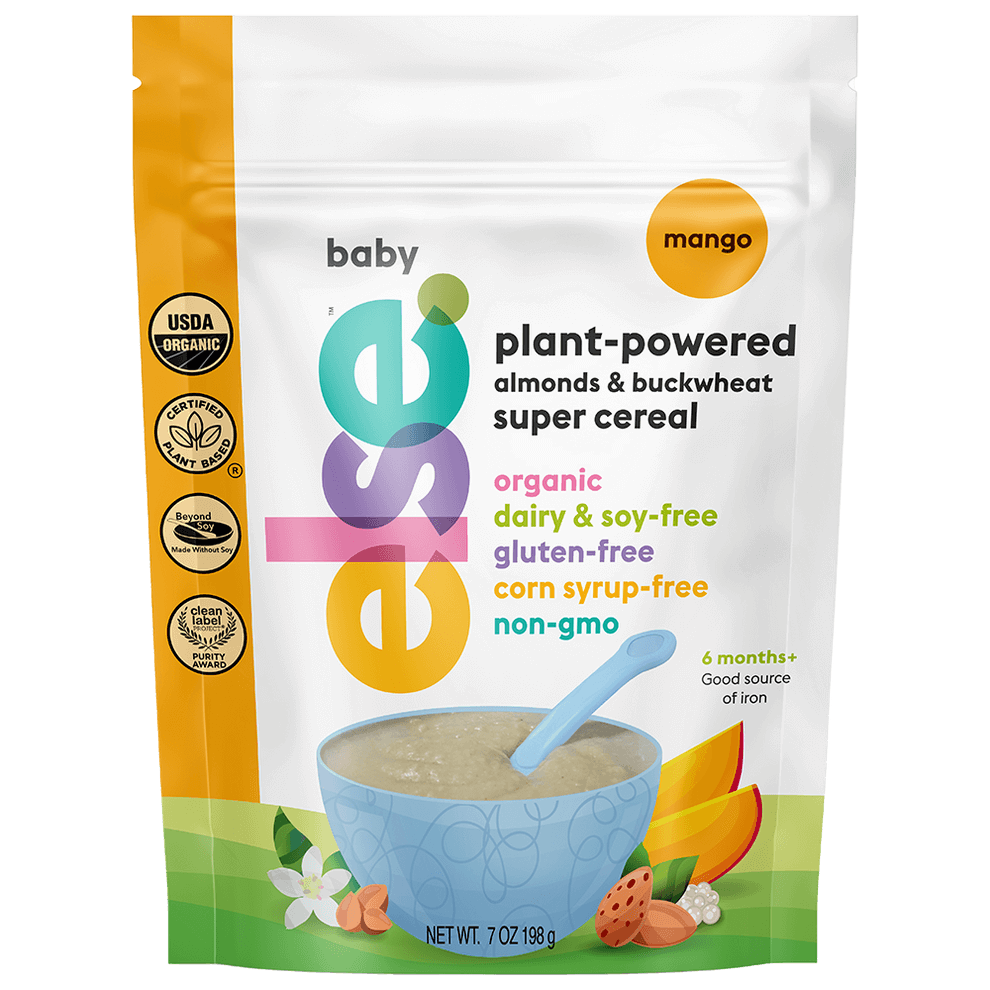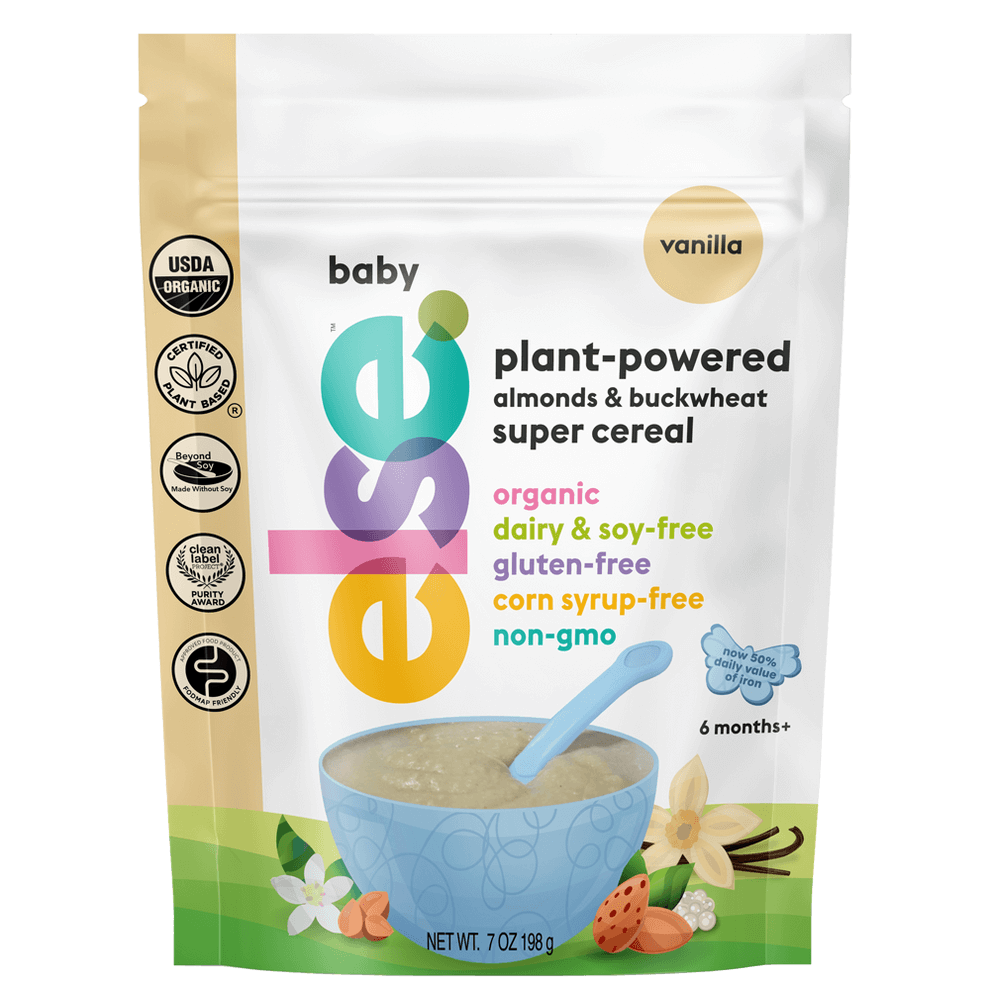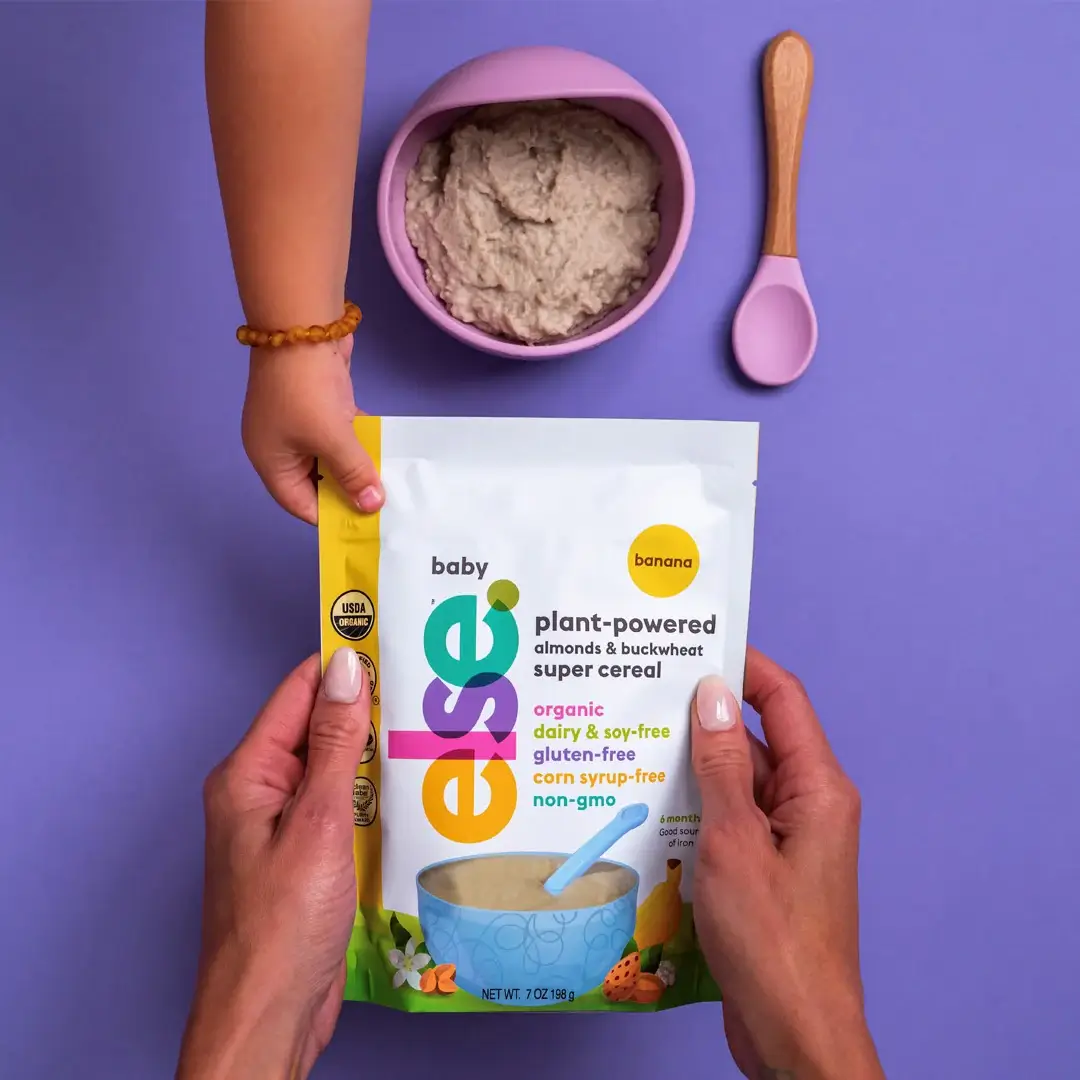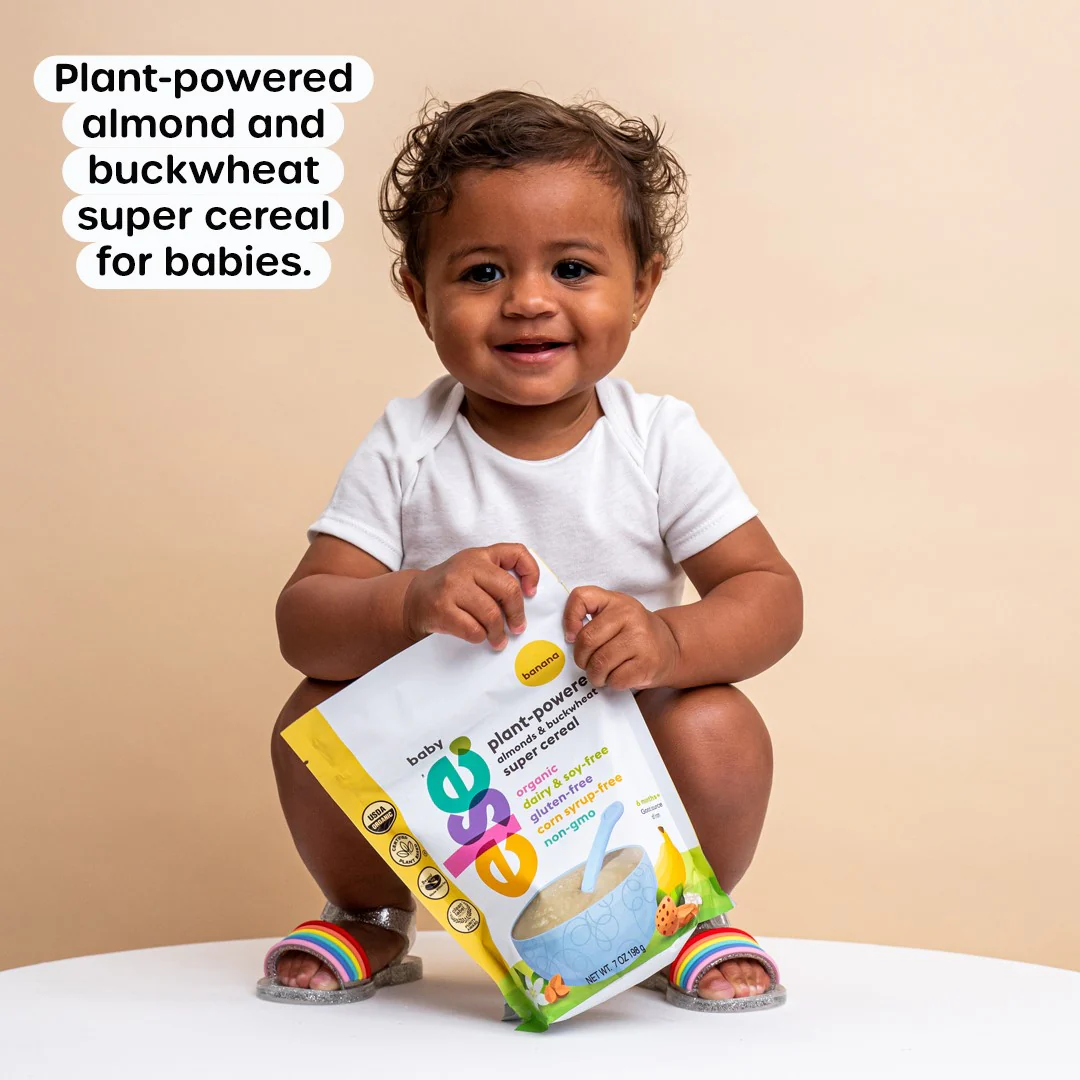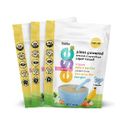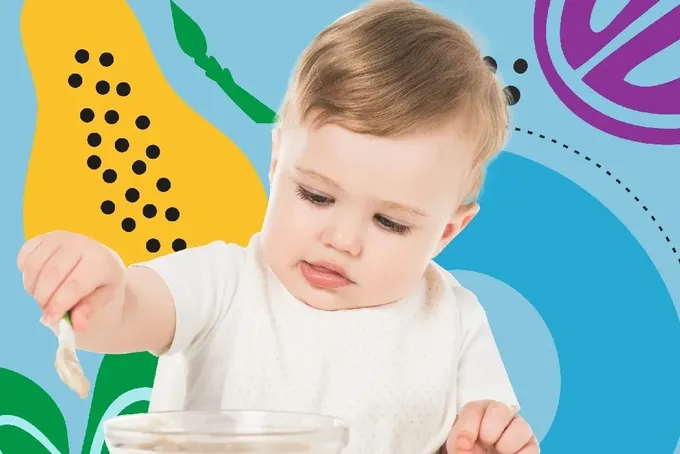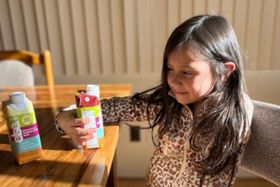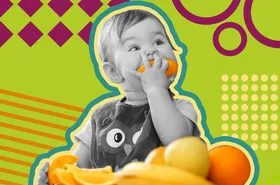Rice Cereal for Babies: Alternatives and Tips
Is rice cereal the only option? Discover a world of nutritious first foods for your transitioning baby.
Updated June 26, 2024
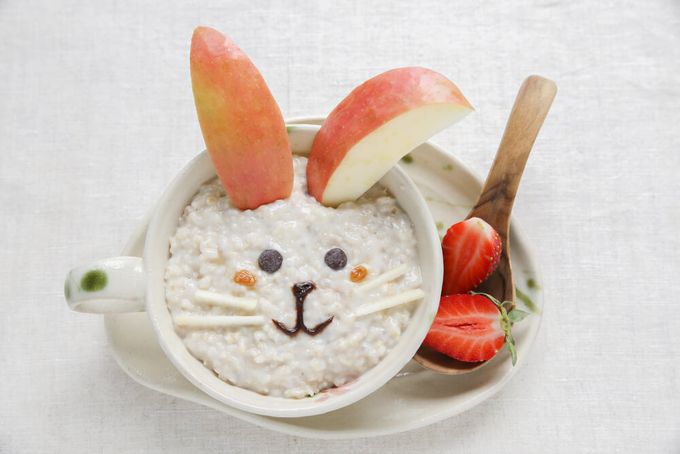
Rice cereal has long been considered the standard when it comes to the first solid foods for babies. However, more recent findings suggest that rice cereal may not be all it’s been cracked up to be for babies. It sounds daunting, but the good news is that you can try plenty of alternatives if you’re considering changing formulas.
Why Is Rice Cereal So Popular?
Rice cereal has been a standard first food for babies for generations. This is because rice is easy for little tummies to digest, is naturally gluten-free and low risk for triggering an allergic reaction, and is generally very well tolerated as a first solid food. Rice has a neutral, bland flavor that isn’t offensive to most babies, encouraging solid food acceptance.
Plus, rice is an inexpensive food. Rice cereal has been specifically designed to contain vitamins and minerals that a growing baby needs as they transition from breast milk or formula to solids.
Downsides of Rice Cereal
A closer look into baby foods, including rice cereal and rice-containing products like rusks and puffs, has encouraged many parents to choose alternative first foods for their babies.
The biggest reason is that rice naturally contains arsenic due to how it’s grown. Arsenic is a naturally occurring heavy metal widely present in the earth's crust, which means it’s often found in the soil where rice is grown.
Why is arsenic problematic? It’s a known carcinogen or cancer-causing agent in humans, which can also negatively impact immunity and increase the risk for numerous diseases. Given the small physical size of babies, ingestion of arsenic can be more concerning if in large amounts. Some sources say that rice intake is about three times as high among infants compared to adults.
Of course, rice isn’t the only arsenic-containing food. Other fruits, vegetables, and plant foods are also exposed to arsenic, but rice is particularly susceptible to absorbing it. This is because rice is grown in a paddy or a small flooded field, so any arsenic in the water supply binds to the rice as it grows and accumulates.
To complicate things more, the amount of arsenic present in different soils varies. Certain regions around the world have less arsenic in their soil than others. For instance, some reports suggest that white Basmati rice or sushi rice purchased from Pakistan, India, or California are less likely to have significant amounts of arsenic in them.
You can prepare rice grains in ways that help reduce arsenic content by rinsing them before cooking, boiling them in more water than is needed (like you boil pasta), and draining the excess liquid. Unfortunately, there’s no way for parents to control how much arsenic is in rice-containing baby products like teething biscuits, puffs, and infant rice cereal.
Overall, according to the US Food and Drug Administration, rice-containing baby foods are considered a significant source of inorganic arsenic in the diet, and their ingestion should be monitored.
Despite the concern over the arsenic content of rice, don’t let this cause you panic as you begin transitioning your baby to solid foods. If you’ve been offering rice cereal, or you’d like to incorporate it as a first food, the most important thing is that it’s not the only food you’re relying on. Being aware of how much rice your baby is ingesting is most important, as is keeping it to a minimal level.
What Can I Use Instead of Rice Cereal?
If your baby doesn’t like rice or you’d just prefer to use something else, rest assured that there are plenty of alternatives to rice cereal. In addition to rice-free infant cereals, first foods can also be a wide variety of fruits, vegetables, and other foods offered in age-appropriate form and consistency.
Alternatives to Rice Cereal
Looking for a rice cereal substitute? No problem. Despite all of the attention it receives, rice isn’t the only cereal available for babies.
Some popular alternatives to infant rice cereal include:
- Oat cereal
- Barley cereal
- Quinoa cereal
- Almonds and Buckwheat cereal
- Multigrain cereal
Many baby cereals will contain a combination of these grains or even a grain with a fruit and vegetable added to it.
The most important factor in determining which alternative baby cereals you want to use is whether they have been fortified to contain essential nutrients, especially iron. Iron is critical for babies as it plays a role in cognitive development and helps prevent anemia.
Not all infant cereals contain added iron, which may be an otherwise more challenging nutrient to make sure your baby gets enough of when transitioning to solids. Look for packaging that states it is iron-fortified, or check the nutrition facts panel to determine whether it contains iron.
Other First Foods for Babies
There’s a common misconception that every baby has to be fed cereal, or rice cereal, as their main first food.
The truth is that, as long as the food is presented in an age-appropriate way, your baby can enjoy a varied palate from early on that may or may not include rice or oatmeal cereals for babies. This means choosing nutrient- and energy-dense foods and also serving them in safe consistencies.
Some alternative, non-cereal first foods for babies can include:
- Avocado
- Mashed beans and lentils
- Soft-cooked fortified pasta
- Quinoa
- Buckwheat
- Amaranth
- Millet
- Farro
- Finely ground nuts and seeds mixed into a recipe
- Sesame seeds
- Thinly spread or drizzled nut and seed butter
- Cooked corn
- Cooked peas
- Peeled and cooked/mashed potatoes and sweet potatoes
- Couscous
- Chia, ground flax, hemp seeds
- Tofu
- Toast strips
- Roasted squash and zucchini sticks
- Roasted broccoli, chopped
- Peaches, peeled or canned
- Steamed cucumber
- Roasted beet sticks, peeled
- Strawberries, watermelon, raspberries, and mango, mashed or cut into strips
» Find out when to start finger foods for babies
3 Tips for Introducing Solids
While you may offer purees or practice spoon-feeding with your baby, many parents choose to do baby-led weaning or combine the two approaches.
However you decide to introduce solids to your baby, below are a few tips to help make the transition as smooth and stress-free as possible.
1. Readiness
First, make sure your baby has demonstrated that they are ready to start transitioning toward solid foods.
Note that while some babies may be ready around four months of age, there is no benefit to introducing solids before that age. For most babies, six months is an optimal time to begin exploring.
Some of the signs of feeding readiness include:
- Your baby is around six months of age.
- They are interested in the food around them, which may be on someone else’s plate.
- Your baby no longer uses the tongue-thrust reflex that prevents food from staying in their mouth.
- They are sitting up on their own, without instability in the head and neck, for at least a minute at a time.
- They reach their hands to objects of interest, grab them, and bring them to their mouth, meaning they already developed eye-hand-mouth coordination.
2. Safety
The most important thing to remember when introducing foods to your baby is that the texture and consistency of the food need to be safe for them.
Firstly, foods must be soft enough for a baby to eat by mashing with their gums, as they have no teeth to chew. To ensure a particular food is safe to serve, assess its consistency by applying pressure to the food between your fingers to mimic gumming.
This also means avoiding known choking hazards, as well as foods that your baby may not be ready for quite yet.
Additionally, never leave your baby unattended while they are eating.
Some of the foods that are best to avoid when just starting your baby on solids include:
- Salt, sugar, honey: These items are not necessary for kids this young and also come with potential risks. For instance, honey can contain Clostridium botulinum bacterial spores, added sugar offers calories with no health benefit, and immature kidneys may not adequately process salt before 12 months of age.
- Milk: Whether you choose dairy or plant-based milk for your kids, this isn’t a necessary food to include right away, as they will still be getting most of their nutrition from breast milk or formula for a little bit. Plus, too much milk at this age can take up space in small tummies and prevent your baby from actually eating the solid foods you offer.
- Foods that form a ball when eaten: Things like crackers and thick bakery bread may taste good to us, but they can be dangerous for young children. These foods can become a gob in the mouth, presenting a choking hazard.
- Raw nuts, seeds, and popcorn: Children younger than 4-5 years old should not be given these foods as they are a major choking hazard at this age.
- Dollops of nut/seed butters: While you can thin nut/seed butters with water as a drizzle, babies should not be offered gobs of these foods as they can get stuck in their throat.
- Segmented fruits and vegetables: Babies can learn to suck on things like citrus segments that have had their membranes removed, but whole slices of these items should not be offered yet.
- Circular foods: A great example here is sliced hot dogs. These are the perfect size of food that can get stuck in a child’s airway.
- Unpasteurized dairy and deli meat: If you incorporate animal products like these into your baby’s diet, they should not be offered before 12 months of age. This is due to the increased risk for foodborne bacteria like Listeria, which can be potentially dangerous.
» Discover everything you need to know about baby nutrition
3. Variety
As you plan your baby’s first solids menu, aim for a wide variety of healthy foods. Not only does this help create a nutritionally sound diet for them, but it also exposes your baby to many different flavors and textures. This helps your baby develop their palate of food preferences that can set the stage for a lifetime.
If you utilize iron-fortified baby cereals, like oats or multigrain options, you can prepare these with breast milk or infant formula instead of water to help optimize nutrition.
In addition to baby cereals, offer your baby a variety of soft-cooked grains, legumes, fruits, vegetables, and fats. There’s no guarantee that they will like, or even try, all of the foods you present, but exposure is key.
Diversifying Baby's Diet:
Rice cereal is a standard first food for babies, but many parents are choosing alternatives due to the concern about the arsenic content of rice and rice-containing foods.
Fortunately, there are plenty of alternatives to rice cereal, including iron-fortified baby cereals made from other grains, like oats, quinoa, buckwheat, and barley. Additionally, first foods for babies can—and should—include an abundance of fruits, vegetables, fats, legumes, and whole grains served in age-appropriate ways.
If you want to incorporate some rice cereal into your baby’s diet, that’s okay. Just be sure that rice is not the dominant food being offered, and prioritize exposing your baby to other healthy, nutrient-dense, and lower-risk foods as they transition to solids.
The content and advice provided in this article are for informational purposes only and are not a substitute for medical diagnosis, treatment, or advice for specific medical conditions. Always consult a pediatrician to understand the individual needs of your child.




